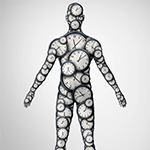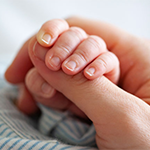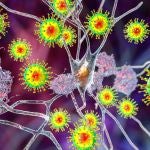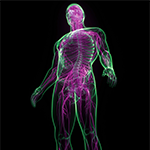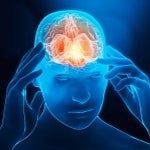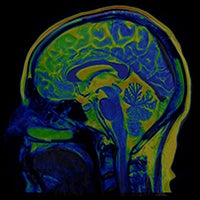Neuro Topics - COVID-19
SEARCH OTHER RESEARCH AREAS
May 21, 2024
New research using functional MRI data finds that how adolescents’ brains were wired — before COVID-19 — predicted their stress, negative emotions, and overall mental health during the height of the pandemic, making them more vulnerable or more resilient.
Original article in: Cerebral Cortex >
March 27, 2024
Q+A with David H. Rosmarin about his team's research into why patients being treated for anxiety weren’t reporting the worsening symptoms during the COVID-19 pandemic. In a cohort of 764 individuals, they found that cognitive behavioral therapy and dialectical behavior therapy appear to have been protective against pandemic-related anxiety.
Original article in: PLOS One >
July 21, 2023
HMS News article on new research from Haiden A. Huskamp and colleagues, first author Lindsay Overhage, finding that the number of young people in the United States visiting hospital emergency departments for mental health crises increased sharply during the second year of the COVID-19 pandemic.
Original article in: JAMA Psychiatry >
May 11, 2023
Harvard Gazette article on new research from Vadim N. Gladyshev and colleagues, first author Jesse R. Poganik, finding that in preclinical models and in humans, stress from surgery, pregnancy, and severe COVID-19 increased signs of biological age, which were reversed following recovery.
Original article in: Cell Metabolism >
April 20, 2023
HMS News article on new research from Rebecca Robbins and colleagues finding that in-person interactions with friends, family, and health care providers were associated with fewer mental health concerns. In contrast, interactions using digital technologies, including emails and video calls, were associated with feelings of depression and anxiety about COVID-19.
Original article in: Journal of Applied Gerontology >
March 31, 2023
HMS News article on new research from Roy H. Perlis and colleagues, first author Andrea G. Edlow, finding that male but not female babies born to women who tested positive for SARS‐CoV‐2 during pregnancy were more likely to be diagnosed with a neurodevelopmental disorder in their first 12 months.
Original article in: JAMA Network Open >
January 25, 2023
HMS News article on new research from Frank J. Slack, Maria Mavrikaki (co-first author with Jonathan lee) and colleagues, finding for the first time the molecular signatures of brain aging in patients with severe COVID-19.
Original article in: Nature Aging >
January 25, 2023
HMS News article on new research from Sandeep Robert Datta, David Brann, Tatsuya Tsukahara, and colleagues at Duke Health and UC San Diego, finding that long-term loss of smell may be linked to an ongoing immune assault on olfactory nerve cells and an associated decline in the number of those cells.
Original article in: Science Translational Medicine >
April 21, 2022
Harvard Medicine News Q+A with Aleena Garner about her research, focusing on how memory affects perception of visual and auditory information.
Original article in: Science Translational Medicine >
April 21, 2022
Harvard Gazette article on a recent conversation with between Harvard’s Mind Brain Behavior Interfaculty Initiative with Professor of Psychology Jesse Snedeker and Professor and author Avi Loeb. This panel discussed the potential challenges of communicating with aliens who may be much more intelligent than us.
Original article in: Science Translational Medicine >
April 21, 2022
Harvard Gazette article on new research from Anne Oaklander and colleagues, suggesting that that some patients with long COVID have lasting nerve damage that appears to be caused by a potentially treatable infection-triggered immune dysfunction.
Original article in: Neurology: Neuroimmunology & Neuroinflammation >
March 8, 2022
HMS News article on new research from Marco Loggia and colleagues, first author Ludovica Brusaferri, suggesting that pandemic-related stressors may lead to brain inflammation in people not infected with SARS-CoV-2.
Original article in: Brain, Behavior, and Immunity >
February 7, 2022
HMS News article on new research from Roy Perlis and colleagues showing links between depressive symptoms and belief in false statements.
Original article in: JAMA Network Open >
September 1, 2021
Harvard Gazette article on new research from the labs of Katie L. McLaughlin and colleagues at the University of Washington, first author Maya L. Rosen, suggesting practical strategies to help children through a pandemic.
Original article in: PLOS One >
December 4, 2020
Connie Cepko shares an innovative technique devised by graduate student Brian Rabe using the reverse-transcription loop-mediated isothermal amplification (RT/LAMP) method to detect SARS-CoV-2 quickly and cheaply.
Original article in: PNAS >
November 30, 2020
Harvard Gazette article on a preliminary MR spectroscopic imaging study of the brain in COVID-19. COVID-19 patients with neurological symptoms show some of the same metabolic disturbances in the brain as patients who have suffered oxygen deprivation from other causes, but also notable differences. From Eva-Maria Ratai and colleagues, co-first authors Otto Rapalino and Akila Weerasekera.
Original article in: American Journal of Radiology >
November 30, 2020
McLean Hospital joins forces with the National Institutes of Health, the U.S. Food and Drug Administration, and several public and private organizations in an Accelerating Medicines Partnership program with $99M contract to find early therapeutic interventions for people at risk for schizophrenia.
Original article in: American Journal of Radiology >
July 28, 2020
HMS News article on new research from the lab of Sandeep Robert Datta and colleagues, co-first authors David H. Brann, Tatsuya Tsukahara, and Caleb Weinreb, demonstrating that olfactory support cells are vulnerable to novel coronavirus infection.
Original article in: Science Advances >
May 26, 2020
The MGH Multicultural Alzheimer's Prevention Program (MAPP) recently launched a research study to examine the impact of COVID19 on the well-being, memory and cognition of ethnically diverse older individuals.
Original article in: Science Advances >




